|
|
|
Sort Order |
|
|
|
Items / Page
|
|
|
|
|
|
|
| Srl | Item |
| 1 |
ID:
139185
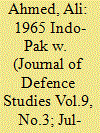

|
|
|
|
|
| Summary/Abstract |
This article seeks to analyse the lessons of the 1965 Indo-Pak war that are applicable today. It finds that the current army doctrine, Cold Start, has some similarities to the opening round of the 1965 war. It argues that even the attritionist strategy adopted in 1965 may have more to give today than the manoeuvre war approach of its more famous successor, the 1971 war. In particular, the article appraises Prime Minister Lal Bahadur Shastri’s firm political control during the war and finds that it was ably reinforced by the prime ministers who were at the helm in India’s later wars. Knowing when to stop is key to avoiding nuclear thresholds, and in that the 1965 war, which stopped short of decisive victory, serves as a suitable precedent to potential future conflicts.
|
|
|
|
|
|
|
|
|
|
|
|
|
|
|
|
| 2 |
ID:
132420
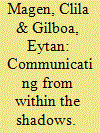

|
|
|
|
|
| Publication |
2014.
|
| Summary/Abstract |
Communicating with the media is an ongoing complicated task intelligence services tackle from the day they are established. The relationship is inherently tense because one side wishes to reveal what the other wishes to conceal, highlighting the constant contradiction between two major principles: the public's right to know versus the government's duty to protect national security. Reconciling these two principles becomes exceedingly complex during crisis situations because both the media and the public demand to know what is happening and why, whereas intelligence services can offer only limited and often incomplete information, a limitation imposed by the need to protect vital secrets. Moreover, the services frequently face a quandary: they are innately secretive and cannot advertise their accomplishments and successes, but these are commonly exposed when they fail. This distorts the natural balance other organizations are generally able to maintain between failures and achievements and any publicity about them.
|
|
|
|
|
|
|
|
|
|
|
|
|
|
|
|
| 3 |
ID:
132411
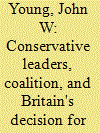

|
|
|
|
|
| Publication |
2014.
|
| Summary/Abstract |
Conservative leaders may have had a decisive impact on the decision by the Liberal government to enter the Great War in August 1914. In a seminal article of 1975, Keith Wilson argued that their readiness to fight "cut the ground … from beneath the feet of the non-interventionists" in the Cabinet. Those ministers who had hitherto opposed war now recognised that continued divisions could bring the government's collapse, in which case the Unionists, probably in a coalition with pro-war Liberals, would take office and enter the conflict anyway. Since Wilson's essay, important light has focussed on Unionist thinking by works that look at the July Crisis as part of a longer party history. This analysis provides a detailed investigation of the actions of Unionist leaders in the days immediately leading to war. It resolves some of the main contradictions in the primary evidence, argues that the possibility of a coalition was very real and demonstrates that one key player-the first lord of the Admiralty, Winston Churchill-subsequently tried, with some success, to disguise his activities.
|
|
|
|
|
|
|
|
|
|
|
|
|
|
|
|
| 4 |
ID:
133071
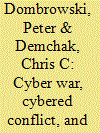

|
|
|
|
|
| Publication |
2014.
|
| Summary/Abstract |
It has been well over a decade since the first “prophets” of information warfare proclaimed a new age of conflict fought not just on air, sea, and land but with electrons in what came to be known as “cyberspace.”1 Since these early predictions, many incidents have confirmed that criminals, random hackers, and government-sanctioned specialists can wreak havoc on governments, military communications systems, and corporations. The Stuxnet worm alone helped delay-by months, perhaps years-the long-standing efforts of Iran to acquire sufficient nuclear material to build nuclear weapons.2 Recent revelations of hacking campaigns against such publications as the Wall Street Journal and New York Times have broadened concerns to include even the integrity of American democratic institutions.3 Meanwhile, the commander of U.S. Cyber Command has characterized cyber attacks designed to gain access to the intellectual property of American corporations as the “greatest transfer of wealth in human history.”
|
|
|
|
|
|
|
|
|
|
|
|
|
|
|
|
| 5 |
ID:
132009
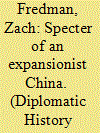

|
|
|
|
|
| Publication |
2014.
|
| Summary/Abstract |
The Chinese Revolution, Korean War, and McCarthyism loomed large over Kennedy administration assessments of Chinese intentions in Vietnam. The president and his advisors disagreed over the exact nature of the Chinese threat, but they uniformly believed in a dangerous, expansionist China. Their assessments promoted cautious escalation in Vietnam, where Kennedy sought to avoid "losing" another Asian country to Communism without provoking another war like Korea. This, in turn, promoted Chinese militancy. Central to Kennedy administration thinking was the idea that Vietnam served as a test case for Beijing's more radical foreign policy line vis-à-vis Moscow. This article traces the development and influence of such assessments. It also argues that the China factor informed Kennedy and Johnson administration notions of credibility. Holding back or reversing Communist gains in Asia by supporting Saigon offered these administrations the chance to kick once and for all the "who lost China" stigma that had haunted the Democratic Party since 1949.
|
|
|
|
|
|
|
|
|
|
|
|
|
|
|
|
|
|
|
|
|